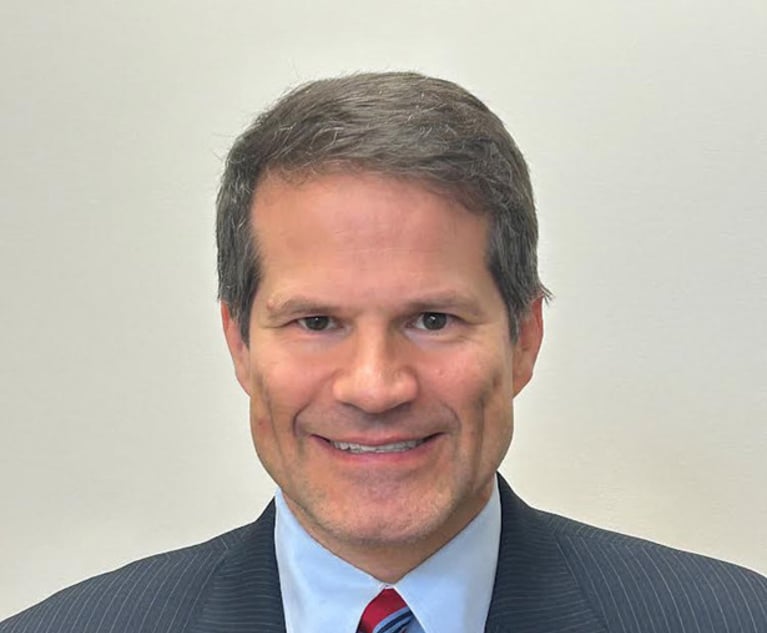 U.S. Department of Justice. Photo: Diego M. Radzinschi/NLJ.
U.S. Department of Justice. Photo: Diego M. Radzinschi/NLJ.DOJ's Legal Counsel Office Picks Up Former US House Lawyer
Kristin Shapiro, a former Williams & Connolly associate, is the latest addition to an office that has played an outsize role in some of the biggest legal issues involving the Trump administration.
December 03, 2019 at 01:20 PM
7 minute read
After three years as a top lawyer for the U.S. House of Representatives, Kristin Shapiro has jumped to an elite Justice Department team that has played a prominent role in clashes between Democratic lawmakers and the Trump administration.
Shapiro, who joined the House general counsel's office under Republican leadership in 2016, had remained in the office for much of this year as Democrats seized on their newfound control of the chamber to investigate and, on several occasions, sue the Trump administration. Last month, she joined the Office of Legal Counsel as an attorney-adviser, landing in a Justice Department unit that grapples with some of the executive branch's most vexing questions of law.
The office has played an outsize role in the Trump administration's refusal to cooperate with House inquiries, as the Justice Department has repeatedly stepped in to block the release of records and prevent the president's top aides from testifying before Congress. Indeed, the office has argued in recent months that top presidential advisers enjoy immunity shielding them from testifying before Congress, and it has endorsed the Treasury Department's refusal to turn Trump's tax records to House Democrats.
Last month, the legal counsel's office issued an opinion asserting that House committees cannot compel executive branch officials to testify in an impeachment proceeding without the assistance of agency counsel, taking aim at congressional rules that have shut administration lawyers out of closed-door questioning on Capitol Hill. Justice Department leaders last year honored a team of six OLC attorney-advisers who had vetted Trump administration executive orders.
Amid the flurry of interbranch litigation, Shapiro made a formal appearance for the House in only one case filed this year: A challenge to Trump's use of executive powers to build a border wall. In June, U.S. District Judge Trevor McFadden of the District of Columbia, among Trump's first appointees to the federal trial court, refused to stop the president from steering billions of dollars to the project. The House's appeal is pending before the U.S. Court of Appeals for the D.C. Circuit.
Last year, when the House was under Republican leadership, Shapiro intervened on behalf of GOP lawmakers to prevent the release of congressional records to American Oversight, a watchdog group that sued under the Freedom of Information Act for communications related to tax reform and the unsuccessful effort to repeal the Obama administration's signature health care law.
 Kristin Shapiro
Kristin ShapiroShapiro was joined in those cases by the House's general counsel at the time, Thomas Hungar, who returned to Gibson, Dunn & Crutcher in January. Another lawyer involved in those cases, Kimberly Hamm, left the House this year to become a top adviser and legal counsel to Jay Clayton, the chairman of the Securities and Exchange Commission.
Hungar, who hired Shapiro in 2016, described the former Williams & Connolly associate as a "great litigator, a great writer, a wonderful colleague, a delight to work with—personally and professionally."
"She came very highly recommended, and the recommendations proved entirely accurate. I thought she was superb," he said. This summer, the NLJ named Shapiro among the publication's "Rising Stars" in the District of Columbia.
Shapiro's departure comes as the House general counsel's office is pressed by a hefty caseload. House lawyers, led by general counsel Douglas Letter, have teamed up in some cases with major U.S. firms including Hogan Lovells, Debevoise & Plimpton and Munger, Tolles & Olson.
The House last month hired Will Havemann, a former lawyer on the appellate staff of the Justice Department's civil division, which defends government policies in federal appeals across the country. This year, more than a half dozen members of the appellate staff have resigned, a sum that one former Justice Department official described as a "huge percentage" of a team that is considered at full strength with 60 lawyers.
Shapiro joined a Justice Department office headed by assistant attorney general Steven Engel, who was previously a partner at Dechert. Curtis Gannon is the principal deputy assistant attorney general at OLC, serving as the second in charge. Gannon joined OLC in early 2017 from DOJ's office of the solicitor general, where he had been an assistant since 2000.
 Jennifer L. Mascott, speaking at a Federalist Society conference last year in Washington. Photo: Diego M. Radzinschi/ALM
Jennifer L. Mascott, speaking at a Federalist Society conference last year in Washington. Photo: Diego M. Radzinschi/ALM
The OLC leadership includes four deputy assistant attorneys general—Daniel Koffsky, Henry Whitaker, Liam Hardy and Jennifer Mascott—and three special counsels: Paul Colborn, Rosemary Hart and Jeffrey Singdahlsen. Whitaker, a longtime DOJ appellate lawyer, joined the front office in February 2017. Mascott, a former clerk to Brett Kavanaugh during his time as a judge on the U.S. Court of Appeals for the D.C. Circuit, joined OLC in April from George Mason University Antonin Scalia Law School.
The Trump-era OLC has faced a barrage of criticism over opinions protecting Trump from various demands made by House Democrats.
In September, the OLC signed off on the White House's decision to withhold an intelligence community employee's whistleblower complaint concerning Trump's dealings with Ukraine, which are now the subject of the House impeachment inquiry. The complaint was ultimately turned over to Congress and later released, with redactions, to the public.
"Part of the OLC's long-term value is its credibility as an independent evaluator of the law. There's always risks when you get involved in those matters that it will negatively affect the reputation of the office," said one former OLC lawyer, who spoke on the condition of anonymity to candidly discuss the office.
Earlier OLC opinions approved Trump's move last year to install Matthew Whitaker, formerly chief of staff to then-Attorney General Jeff Sessions, as the acting leader of the Justice Department. That same month, the OLC reversed an Obama-era opinion that had cleared the way for the proliferation of online gambling. The Trump administration OLC opinion reportedly tracked closely with a memo prepared by lobbyists for the casino magnate and prominent Trump donor Sheldon Adelson.
"OLC's very public involvement in the most controversial policies of this White House has done great harm to the office's legitimacy," a former OLC lawyer, Shalev Roisman, wrote in a recent post at the blog Just Security.
Roisman added: "OLC's legal analysis has been at times extreme, and, at others, only barely defensible even on its own flawed terms. Second, OLC has put the Office's institutional credibility on the line in situations that seem more closely tied to the personal political interests of this president than any institutional interest of the presidency."
This content has been archived. It is available through our partners, LexisNexis® and Bloomberg Law.
To view this content, please continue to their sites.
Not a Lexis Subscriber?
Subscribe Now
Not a Bloomberg Law Subscriber?
Subscribe Now
NOT FOR REPRINT
© 2024 ALM Global, LLC, All Rights Reserved. Request academic re-use from www.copyright.com. All other uses, submit a request to [email protected]. For more information visit Asset & Logo Licensing.
You Might Like
View All
Trump Picks Personal Criminal Defense Lawyers for Solicitor General, Deputy Attorney General


'Health Care Behemoth'?: DOJ Seeks Injunction Blocking $3.3B UnitedHealth Merger Proposal
3 minute read
Freshfields Hires DOJ Official, Squire Taps Paul Hastings Atty for US Antitrust Head
3 minute readLaw Firms Mentioned
Trending Stories
- 1How to Support Law Firm Profitability: Train Partners Up
- 2Elon Musk Names Microsoft, Calif. AG to Amended OpenAI Suit
- 3Trump’s Plan to Purge Democracy
- 4Baltimore City Govt., After Winning Opioid Jury Trial, Preparing to Demand an Additional $11B for Abatement Costs
- 5X Joins Legal Attack on California's New Deepfakes Law
Who Got The Work
Michael G. Bongiorno, Andrew Scott Dulberg and Elizabeth E. Driscoll from Wilmer Cutler Pickering Hale and Dorr have stepped in to represent Symbotic Inc., an A.I.-enabled technology platform that focuses on increasing supply chain efficiency, and other defendants in a pending shareholder derivative lawsuit. The case, filed Oct. 2 in Massachusetts District Court by the Brown Law Firm on behalf of Stephen Austen, accuses certain officers and directors of misleading investors in regard to Symbotic's potential for margin growth by failing to disclose that the company was not equipped to timely deploy its systems or manage expenses through project delays. The case, assigned to U.S. District Judge Nathaniel M. Gorton, is 1:24-cv-12522, Austen v. Cohen et al.
Who Got The Work
Edmund Polubinski and Marie Killmond of Davis Polk & Wardwell have entered appearances for data platform software development company MongoDB and other defendants in a pending shareholder derivative lawsuit. The action, filed Oct. 7 in New York Southern District Court by the Brown Law Firm, accuses the company's directors and/or officers of falsely expressing confidence in the company’s restructuring of its sales incentive plan and downplaying the severity of decreases in its upfront commitments. The case is 1:24-cv-07594, Roy v. Ittycheria et al.
Who Got The Work
Amy O. Bruchs and Kurt F. Ellison of Michael Best & Friedrich have entered appearances for Epic Systems Corp. in a pending employment discrimination lawsuit. The suit was filed Sept. 7 in Wisconsin Western District Court by Levine Eisberner LLC and Siri & Glimstad on behalf of a project manager who claims that he was wrongfully terminated after applying for a religious exemption to the defendant's COVID-19 vaccine mandate. The case, assigned to U.S. Magistrate Judge Anita Marie Boor, is 3:24-cv-00630, Secker, Nathan v. Epic Systems Corporation.
Who Got The Work
David X. Sullivan, Thomas J. Finn and Gregory A. Hall from McCarter & English have entered appearances for Sunrun Installation Services in a pending civil rights lawsuit. The complaint was filed Sept. 4 in Connecticut District Court by attorney Robert M. Berke on behalf of former employee George Edward Steins, who was arrested and charged with employing an unregistered home improvement salesperson. The complaint alleges that had Sunrun informed the Connecticut Department of Consumer Protection that the plaintiff's employment had ended in 2017 and that he no longer held Sunrun's home improvement contractor license, he would not have been hit with charges, which were dismissed in May 2024. The case, assigned to U.S. District Judge Jeffrey A. Meyer, is 3:24-cv-01423, Steins v. Sunrun, Inc. et al.
Who Got The Work
Greenberg Traurig shareholder Joshua L. Raskin has entered an appearance for boohoo.com UK Ltd. in a pending patent infringement lawsuit. The suit, filed Sept. 3 in Texas Eastern District Court by Rozier Hardt McDonough on behalf of Alto Dynamics, asserts five patents related to an online shopping platform. The case, assigned to U.S. District Judge Rodney Gilstrap, is 2:24-cv-00719, Alto Dynamics, LLC v. boohoo.com UK Limited.
Featured Firms
Law Offices of Gary Martin Hays & Associates, P.C.
(470) 294-1674
Law Offices of Mark E. Salomone
(857) 444-6468
Smith & Hassler
(713) 739-1250







